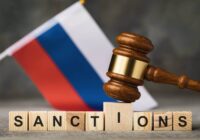Russia and the West seem to be on the same page when it comes to the resolution of the political crisis in Moldova.
Moldova is overcoming its most serious political crisis since its independence from the Soviet Union, which ensued when the incumbent Democratic Party refused to step down despite failing to secure a majority of the popular vote in February. Diplomats from the European Union, the United States and Russia agreed on the legitimacy of the new coalition and consequently applied political pressure to resolve the issue. On June 14, the leadership of the Democratic Party finally resigned and permitted ACUM, a liberal populist coalition combining the Party of Action and Solidarity (PAS) and the Dignity and Truth Platform Party (Platforma DA), to take office.
The diplomatic liaisons between the West and Russia are noteworthy because cooperation between the two sides stalled after Russia’s annexation of Crimea in 2014. Subsequent years of punitive sanctions and a cooling of relations could be eased if the European Union, the United States and Russia hold on to the positivity created by the solution in Chișinău. Such an understanding bodes well for future interactions insofar as both sides demonstrate political will and an acceptable balance of power when managing their Moldovan interests.
Moldova held parliamentary elections on February 24 and later ratified the results on March 9. None of the three main political parties gained enough votes to secure an outright majority, with the Socialist Party (PSRM) gaining 31%, ACUM 26.8% and the Democratic Party (PDM) 23.6%. This created an indecisive result in regard to majority governance and required coalition negotiations.
Neither the Moscow-friendly PSRM nor the Europhile ACUM wanted collaboration with the Democratic Party, which is headed by the oligarch Vladimir Plahotniuc whose reputation is less than stellar. Political entities in Moldova challenge that Plahotniuc’s political dealings are self-serving and based on corrupt practices despite his well-publicized philanthropy. Through his General Media Group and Radio Media Group, Plahotniuc owns four national television and three radio stations. He uses his fortune and considerable power to shift Moldovan politics and legislation in his favor.
How Long Is Three Months?
On June 7, the constitutional court of Moldova asserted that new parliamentary elections would be required if no government was formed by the end of the three-month deadline. The high court also demanded a dissolution of parliament. As a result, the ACUM and PSRM quickly reached a manageable coalition government, with ACUM’s Maia Sandu ascending to the role of prime minister on June 8. Both parties believed the final agreement was reached by the acknowledged timeline since election results were ratified on March 9.
At this point, the court barred the prospective coalition government and considered the bipartisan deal unconstitutional. Judges argued that the agreement between ACUM and PSRM exceeded the time limit for a prospective administration to take power. Article 85 of the Moldovan Constitution states: “In the event of impossibility to form the Government or in case of blocking up the procedure of adopting the laws for a period of 3 months, the President of the Republic of Moldova, following consultations with parliamentary fractions, may dissolve the Parliament.” It is this interpretation of what three months actually means that consequently led to the crisis.
While these events transpired, the constitutional court suspended the democratically elected PSRM president, Igor Dodon, for refusing to dissolve parliament. The departing prime minister from the Democratic Party, Pavel Filip, was appointed to the role of acting president and, in doing so, the court installed a figurehead to act on its behalf. Filip heeded its demand to call for new parliamentary elections.
The United States, the European Union and Russia all desired the same settlement in Moldova — for the Democratic Party, led by Vladimir Plahotniuc, to step down and engage in a transfer of power to the legitimately elected coalition government headed by Maia Sandu. This is exactly what happened.
It is a matter of semantics whether three months means a block of time in relation to the natural phases of the moon or 90 days. The settlement between ACUM and PSRM manifested a day late of the 90-day limit but a day before of a three-month deadline. It is typical of states or organizations to prudently extend due dates if it seems a realistic resolution is ahead.
The real root of this crisis lay not in the timing discrepancies but rather the unified decision of two political parties to leave Plahotniuc out of power-brokering decisions. The constitutional court is stacked with judges linked to Plahotniuc, and so it should have been expected that it would quash any resolution that disregarded the oligarch’s interests.
This political quandary was further complicated by the fact that incumbent Democratic Party leadership and the ACUM’s Maia Sandu acted as the legitimate government. Neither faction backed down from its claims to power or stepped down from previously held public offices. Moldova is ill equipped to manage an internal domestic crisis in which neutrality and an ethical legislative framework are lacking. A structured and fair transitional procedure is required to overcome constitutional crises of the future, and unified international guidance could achieve that.
International Consensus
The United States, the EU and Russia released statements in support of the ACUM coalition government. Attention should be paid to this key moment as it is the first time Western and Russian diplomats agree over a crisis since relations soured in 2014. Each side has its own particular motives and interests, but it provides an excellent opportunity for collaboration from which Moldova could only win.
Igor Dodon specifically requested international mediation to solve the deadlock in Chișinău, stating that “In this situation, we have no choice but to appeal to the international community to mediate in the process of a peaceful transfer of power.” Accordingly, experienced emissaries from the US, the EU and Russia met in the Moldovan capital to push for a solution prior to the constitutional court’s interference.
Russia needs a Kremlin-friendly government in Chișinău. Moscow entertains few illusions that Moldova will completely return into its fold after it has turned toward a European future. The population identifies more as Romanian than Russian. However, Moscow wants a conduit to secure pro-Kremlin policies and assurances that the breakaway republic of Transnistria remains under its influence. The Socialist Party fits nicely into this role, and its involvement in a coalition government is advantageous. In this structure, parliamentary representation permits the continuation of friendly ties with Russia.
The resignation of the Democratic Party and the sudden departure of Plahotniuc suits Russia well. Moscow is deeply skeptical of Plahotniuc and his intentions. He is viewed as an untrustworthy opportunist who proposes Kremlin-friendly policies if it suits his personal agenda. For example, it is alleged that he presented the idea to federalize Moldova so that Transnistria could enjoy a special autonomous status in exchange for Russian criminal cases against him being dropped.
One such charge claims that Plahotniuc laundered $582 million through two Russian banks, although this allegation emerged prior to the parliamentary elections and could be viewed as a strategic misinformation drop. Conversely, Plahotniuc is known to present anti-Russian arguments to Western audiences when it seems politically expedient. The West prefers the Sandu coalition government because it demonstrates a democratic election result and power-brokerage. For example, the US State Department released a statement highlighting the competitive nature of the parliamentary elections and that these results must be respected to ensure a democratic future for Moldova. Prime Minister Maia Sandu seeks to foster stronger ties with the EU as well.
It is obvious that the Democratic Party under Pavel Filip sought approval from the Trump administration to end the political impasse in its favor. On June 12, Filip announced that Moldova would relocate its embassy from Tel Aviv to Jerusalem, a contentious act that mirrors Donald Trump’s own move last year. This decision was blatant political messaging to Washington that Plahotniuc and Filip viewed US support as the definitive solution to extending the party’s time in power. It was extremely miscalculated to assume that sudden adoption of Trump’s preferred policy would quickly shift into definitive backing.
Sandu’s plans to build closer ties with the EU bode well for integration projects in Moldova, steering the European Neighborhood Project away from perpetual stagnation related to rampant government corruption. Anti-corruption is a pillar in ACUM’s political platform, so it is indispensable that the coalition government was finally legitimized for these projects to have a future.
Moldova’s internal political dynamics remain in shambles even with the installation of a new coalition government. However, the common view shared by Western powers and Russia provides possibilities that multilateral dialogue could resolve other diplomatic problems since each saw the same solution in the Chișinău standoff. The break in relations over events in 2014 will not be easily pardoned, but first steps toward cooperation remain a notable development. This creates the need to responsibly focus on a resolution toward stabilization of Moldova rather than the need to push any geopolitical agenda.
Balance of Powers
Neither the US, the EU or Russia should push their interests too strongly in such a complex situation of a new government in a state hampered by corruption. Calls by commentators to direct greater liberal democratic support to Moldova during this critical time are accurate but precarious at the same time. The country needs help to restore its political integrity and construct a government system focused on the rule of law. It is especially telling that the political class requires a reconstruction when a nation’s highest court sided with a powerful oligarch and employed political gamesmanship in attempts to extend the Democratic Party’s rule.
However, at the current time, the immediate goal should be a smooth transition of power, and this can only occur if pro-EU and pro-Russian entities collaborate. Platforma DA, PAS and the Socialists must find a balance between commitment to Europe-leaning policies and a productive relationship with Russia. Such an arrangement would be representative of their respective party platforms and in Moldova’s best interests.
 Russia should not try to extend its influence in the former Soviet republic during this period of instability either. Pushing further influence during this time would be detrimental to the notion that Moscow played a rational role in resolution. As a result, the Kremlin would be faced with further calls for international isolation rather than a chance to work with diplomatic partners on other issues. Rather, Moscow should be pleased with the opportunity to be a deciding actor, and that a voice for pro-Russian interests remains within the parliamentary coalition. However, if the US and the EU strongly promote their positions as the only option, Moscow will undoubtedly push back.
Russia should not try to extend its influence in the former Soviet republic during this period of instability either. Pushing further influence during this time would be detrimental to the notion that Moscow played a rational role in resolution. As a result, the Kremlin would be faced with further calls for international isolation rather than a chance to work with diplomatic partners on other issues. Rather, Moscow should be pleased with the opportunity to be a deciding actor, and that a voice for pro-Russian interests remains within the parliamentary coalition. However, if the US and the EU strongly promote their positions as the only option, Moscow will undoubtedly push back.
Russia’s perceived misinformation campaign regarding money laundering charges against Plahotniuc has provoked claims of foreign interference. However, in this instance it seemed to achieve very little. Dislike of Plahotniuc is strong enough that it united other parties against him to create a coalition government that purposely ignored his authority. Russia’s aspirations to derail the political career of an unscrupulous oligarch coincidentally aligned nicely with the US and the EU’s requests that democratic representation be respected in Moldova.
In order to liberate itself from a “criminal, dictatorial regime,” Dodon called on Moldovan citizens to partake in “unprecedented mobilization and peaceful protests.” Threats of mass protests across the country acted as the principal catalyst for the Filip’s stepping down on June 14. However, what is relevant to the international relations community is the fact that combined increased pressure from Moscow, Europe and the United States led to a political result acceptable to all.
The EU, the US and Russia all desired the same settlement in Moldova — for the Democratic Party, led by Vladimir Plahotniuc, to step down and engage in a transfer of power to the legitimately elected coalition government headed by Maia Sandu. This is exactly what happened.
Plahotniuc consolidated power around him by filling the constitutional court and high political offices with loyalists. Thus, a political or judicial mechanism to remove the defeated Democratic Party from power is absent. This must be rectified over time. Once again, collective international pressure in the way of a multilateral alliance acted as the soundest path toward resolution. A successful Russian-Western alliance that helped settle the constitutional crisis in Moldova could bode well for future diplomatic endeavors.
The views expressed in this article are the author’s own and do not necessarily reflect Fair Observer’s editorial policy.
Support Fair Observer
We rely on your support for our independence, diversity and quality.
For more than 10 years, Fair Observer has been free, fair and independent. No billionaire owns us, no advertisers control us. We are a reader-supported nonprofit. Unlike many other publications, we keep our content free for readers regardless of where they live or whether they can afford to pay. We have no paywalls and no ads.
In the post-truth era of fake news, echo chambers and filter bubbles, we publish a plurality of perspectives from around the world. Anyone can publish with us, but everyone goes through a rigorous editorial process. So, you get fact-checked, well-reasoned content instead of noise.
We publish 2,500+ voices from 90+ countries. We also conduct education and training programs
on subjects ranging from digital media and journalism to writing and critical thinking. This
doesn’t come cheap. Servers, editors, trainers and web developers cost
money.
Please consider supporting us on a regular basis as a recurring donor or a
sustaining member.
Will you support FO’s journalism?
We rely on your support for our independence, diversity and quality.






